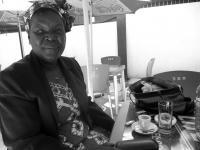 Paulina Chiziane (Majacaze, 1955) is surely one of the most prominent figures of current Mozambican literature, and not just that. She is an essential reference for the country’s feminist movements, a woman who confronted particularly conflictual aspects of African cultures in her literary works with startling intensity, developing themes that no one else wants to hear or discuss, not in the private sphere, much less in the public or political spheres. These are silenced themes, taboos, especially painful, pending and unresolved subjects, such as the Mozambican civil war, women’s rights in polygamy and black magic.
Paulina Chiziane (Majacaze, 1955) is surely one of the most prominent figures of current Mozambican literature, and not just that. She is an essential reference for the country’s feminist movements, a woman who confronted particularly conflictual aspects of African cultures in her literary works with startling intensity, developing themes that no one else wants to hear or discuss, not in the private sphere, much less in the public or political spheres. These are silenced themes, taboos, especially painful, pending and unresolved subjects, such as the Mozambican civil war, women’s rights in polygamy and black magic.
25.02.2019 | by Doris Wieser
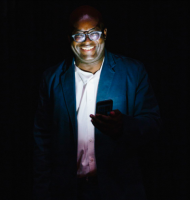 Movement is at the core of life, not necessarily space. If it is translated into space, this is done by means of space being perceived as movement. Therefore, we are facing two completely opposing philosophies. From this point of view, the African movement philosophy, the pre-colonial one, is similar to a rationale specific to the digital world, according to which, fundamentally, one seeks to create connectivity, using networks, instead of tracing categories, classifying, establishing hierarchies and limiting movement.
Movement is at the core of life, not necessarily space. If it is translated into space, this is done by means of space being perceived as movement. Therefore, we are facing two completely opposing philosophies. From this point of view, the African movement philosophy, the pre-colonial one, is similar to a rationale specific to the digital world, according to which, fundamentally, one seeks to create connectivity, using networks, instead of tracing categories, classifying, establishing hierarchies and limiting movement.
21.01.2019 | by António Guerreiro
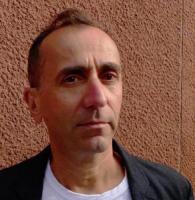 In Europe and the United States, there is also the specific return to colonial form and nostalgia. In Portugal, I’ve been struck by the visible presence of what are still referred to as the “explorers” or the “discoveries,” rather than “colonizers” and “encounter.” The depiction of African bodies in official art and monuments is often stereotyped, almost degrading. I don’t see this, unfortunately, as an exception but as an example of the new divisions. Universities set a poor example here, with minorities and people of color being systematically underrepresented on both sides of the Atlantic.
In Europe and the United States, there is also the specific return to colonial form and nostalgia. In Portugal, I’ve been struck by the visible presence of what are still referred to as the “explorers” or the “discoveries,” rather than “colonizers” and “encounter.” The depiction of African bodies in official art and monuments is often stereotyped, almost degrading. I don’t see this, unfortunately, as an exception but as an example of the new divisions. Universities set a poor example here, with minorities and people of color being systematically underrepresented on both sides of the Atlantic.
27.06.2017 | by Inês Beleza Barreiros
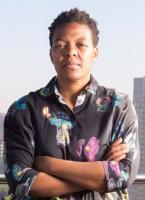 Our duty, as creative people, to paraphrase the late Nina Simone, should always be to reflect the times we live in. We do this also by challenging constructions of history that have and continue to favour the powerful as we fight for the future we want to see and experience in the world, beyond our own physical existences.
Our duty, as creative people, to paraphrase the late Nina Simone, should always be to reflect the times we live in. We do this also by challenging constructions of history that have and continue to favour the powerful as we fight for the future we want to see and experience in the world, beyond our own physical existences.
31.01.2017 | by Gabi Ngcobo and Katerina Valdivia Bruch
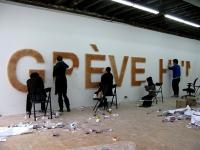 Art’s potential is something that can’t be measured, what the encounter with an artwork can do to a subject, how the freedom trapped in a sculpture, a painting, a statement can influence a singularity and masses cannot be said. That also explains our position: we don’t have any superstitious belief in the immediate political efficacy of our work, this is somehow not our main worry, artworks hopefully survive artists and the time for our work to truly touch people might not even have come yet. Like any artist we work because we need to, it’s our way to stay alive.
Art’s potential is something that can’t be measured, what the encounter with an artwork can do to a subject, how the freedom trapped in a sculpture, a painting, a statement can influence a singularity and masses cannot be said. That also explains our position: we don’t have any superstitious belief in the immediate political efficacy of our work, this is somehow not our main worry, artworks hopefully survive artists and the time for our work to truly touch people might not even have come yet. Like any artist we work because we need to, it’s our way to stay alive.
11.10.2016 | by Leonardo Araújo, Alex Flynn and Claire Fontaine
 We want a black dyke for president.
We want a person with AIDS for president and we want a trans person for vice president and we want someone with no health insurance and we want someone who grew up in a place where the earth is so saturated with toxic waste that didn’t have a choice about getting leukemia. We want a latino faggot for president who saw their best friends die in a mass shooting. We want a president that had an abortion at sixteen and we want a candidate who is a part-time hooker. We want a differently abled refugee for president. We want a president with no airconditioning, who has stood in line at the clinic, who stole their last meal and has been unemployed and was sexually harassed and gaybashed and deported.
We want a black dyke for president.
We want a person with AIDS for president and we want a trans person for vice president and we want someone with no health insurance and we want someone who grew up in a place where the earth is so saturated with toxic waste that didn’t have a choice about getting leukemia. We want a latino faggot for president who saw their best friends die in a mass shooting. We want a president that had an abortion at sixteen and we want a candidate who is a part-time hooker. We want a differently abled refugee for president. We want a president with no airconditioning, who has stood in line at the clinic, who stole their last meal and has been unemployed and was sexually harassed and gaybashed and deported.
15.09.2016 | by Pedro Marum
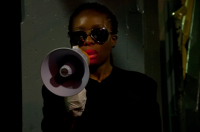 It comes to the present time and looks at African struggle fighters – the construction of the sole hero- and the possibilities that the archive should include other partners by featuring their spouses names in the conversation, however, open to other additions and manners in which to author our histories.
It comes to the present time and looks at African struggle fighters – the construction of the sole hero- and the possibilities that the archive should include other partners by featuring their spouses names in the conversation, however, open to other additions and manners in which to author our histories.
31.05.2016 | by Euridice Kala
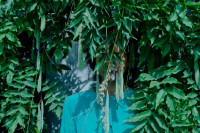 Our original strategy was always to bring African artists to the international stage, which I think is what is missing, and maybe one day we would be very happy to go but I think there are many other places where we can go, which we are trying to do already, for example, workshops for galleries, for artists. I think there’s much more on the educational side of things that we can bring with our knowledge to the continent than having a commercial initiative about sales.
Our original strategy was always to bring African artists to the international stage, which I think is what is missing, and maybe one day we would be very happy to go but I think there are many other places where we can go, which we are trying to do already, for example, workshops for galleries, for artists. I think there’s much more on the educational side of things that we can bring with our knowledge to the continent than having a commercial initiative about sales.
08.05.2016 | by Icaro Ferraz Vidal Junior
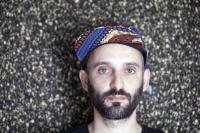 That same evening, Pedro Coquenão, aka Batida, had a Skype meeting planned with one of the activists to talk about “family stuff.” It obviously didn’t go through– his friend had been arrested. The 40 year-old Angolan-born, Lisboa-raised-and-based musician and creative is also an active voice and mind for an evolved and more equal Angolan society– a facet revealed by Coquenão throughout the years as a radio host in Portugal and a DIY documentary director and a musician, first as DJ Mpula and now as Batida.
That same evening, Pedro Coquenão, aka Batida, had a Skype meeting planned with one of the activists to talk about “family stuff.” It obviously didn’t go through– his friend had been arrested. The 40 year-old Angolan-born, Lisboa-raised-and-based musician and creative is also an active voice and mind for an evolved and more equal Angolan society– a facet revealed by Coquenão throughout the years as a radio host in Portugal and a DIY documentary director and a musician, first as DJ Mpula and now as Batida.
17.09.2015 | by Ricardo Miguel Vieira
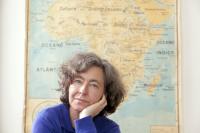 Revolutionary female figures, such as Josina Machel, for example, are represented as saints, without bodily form. For me, Yvone Kane should in a way, be represented like Josina Machel. There is a very chaste side to revolutionaries, as if the women were perfect. Not even in the history books do we find out who they really were.
Revolutionary female figures, such as Josina Machel, for example, are represented as saints, without bodily form. For me, Yvone Kane should in a way, be represented like Josina Machel. There is a very chaste side to revolutionaries, as if the women were perfect. Not even in the history books do we find out who they really were.
14.04.2015 | by Marta Lança
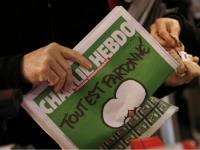 It is simply not acceptable in our day and age to show oneself incapable of truly appreciating the sincere feelings and worldview of others, while at the same time stroking one’s own ego and praising openmindedness and respect for differences at every turn! This inability to look at oneself objectively results from sheer autism.
It is simply not acceptable in our day and age to show oneself incapable of truly appreciating the sincere feelings and worldview of others, while at the same time stroking one’s own ego and praising openmindedness and respect for differences at every turn! This inability to look at oneself objectively results from sheer autism.
27.01.2015 | by Boubacar Boris Diop
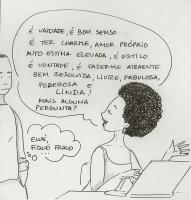 "I don't consider Brazil that different from Angola, culturally speaking. By the way, Angola currently consumes a lot of global culture. Mostly younger people. Not even the differences in language are an obstacle to the understanding of my comics."
"I don't consider Brazil that different from Angola, culturally speaking. By the way, Angola currently consumes a lot of global culture. Mostly younger people. Not even the differences in language are an obstacle to the understanding of my comics."
19.12.2013 | by Luís Henrique and Global Voices (Vozes Globais)
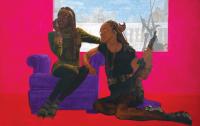 The first time I saw Rainha Nzinga of Matamba, I was walking across Luanda's Kinaxixi square with a friend. We stopped to admire the vast bronze tribute to the seventeenth-century Mbundu monarch, who not only fought Portuguese armies, but caused consternation among her own people and played a significant role in developing the Angolan slave trade. I was immediately impressed by the statue, although my friend, an Angolan journalist, was less so. 'In real life, you'd have seen her breasts,' he said, 'but they've been covered up to appease our modern sensibilities.'
The first time I saw Rainha Nzinga of Matamba, I was walking across Luanda's Kinaxixi square with a friend. We stopped to admire the vast bronze tribute to the seventeenth-century Mbundu monarch, who not only fought Portuguese armies, but caused consternation among her own people and played a significant role in developing the Angolan slave trade. I was immediately impressed by the statue, although my friend, an Angolan journalist, was less so. 'In real life, you'd have seen her breasts,' he said, 'but they've been covered up to appease our modern sensibilities.'
06.11.2012 | by Lara Pawson
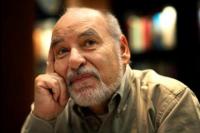 He is Moroccan and French at the same time. He writes in French and nowadays looks at the social and cultural transformations in the countries of the Arab Spring. And expects the new France will adopt a different attitude relating to dictatorships.
With his two passports and the belief in the writer’s role of “criticizing, denunciating, and intervening”, Tahar Ben Jelloun was at Calouste Gulbenkian Foundation at the end of June for a conference in which his aim was “explaining the Arab Spring”.
He is Moroccan and French at the same time. He writes in French and nowadays looks at the social and cultural transformations in the countries of the Arab Spring. And expects the new France will adopt a different attitude relating to dictatorships.
With his two passports and the belief in the writer’s role of “criticizing, denunciating, and intervening”, Tahar Ben Jelloun was at Calouste Gulbenkian Foundation at the end of June for a conference in which his aim was “explaining the Arab Spring”.
03.09.2012 | by Sofia Lorena
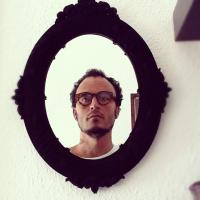 And he answers that the production company that he is part of, Generation 80, was born under a very good star: “there is a crisis in the world, money is for some people ever more difficult to get, but technology is also more at hand for everybody. There are advantages in these days of bureaucracies and problems getting a foot in the door – you don’t need an investment of millions to work in this field and to make a film with a camcorder.”
And he answers that the production company that he is part of, Generation 80, was born under a very good star: “there is a crisis in the world, money is for some people ever more difficult to get, but technology is also more at hand for everybody. There are advantages in these days of bureaucracies and problems getting a foot in the door – you don’t need an investment of millions to work in this field and to make a film with a camcorder.”
23.07.2012 | by Marta Lança
 He paid a visit to studios in the musseques (local neighbourhoods), he had talks with producers to give support for his Akwaaba Music, a digital platform dedicated to African music and pop culture, providing visibility for quality people in music who don’t have the structure needed to go far in the business. In the last 3 years, Lebrave has produced works with more than 70 artists from 15 African countries and has been working on the development of a global network covering the production of contents, digital distribution, marketing and licensing.
He paid a visit to studios in the musseques (local neighbourhoods), he had talks with producers to give support for his Akwaaba Music, a digital platform dedicated to African music and pop culture, providing visibility for quality people in music who don’t have the structure needed to go far in the business. In the last 3 years, Lebrave has produced works with more than 70 artists from 15 African countries and has been working on the development of a global network covering the production of contents, digital distribution, marketing and licensing.
23.07.2012 | by Marta Lança
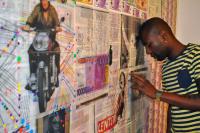 Yonamine is very spontaneous in his work: he thinks about pictures or objects, old photographs, cigarettes packs, or curious textures, then follows their trail to create, to subvert certain applications and to give them other semiotic readings, by reinventing the fragments of different memories in a register of composed intelligibility. Conflict and unpredictability abound in his work and it’s this not classifiable side that troubles, in a good way, who watches it. You can immediately feel the urgency, and this may come largely from living in Angola.
Yonamine is very spontaneous in his work: he thinks about pictures or objects, old photographs, cigarettes packs, or curious textures, then follows their trail to create, to subvert certain applications and to give them other semiotic readings, by reinventing the fragments of different memories in a register of composed intelligibility. Conflict and unpredictability abound in his work and it’s this not classifiable side that troubles, in a good way, who watches it. You can immediately feel the urgency, and this may come largely from living in Angola.
14.04.2012 | by Marta Lança
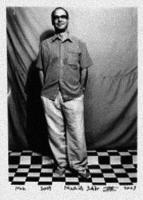 A particular cultural expression results from an expectation that a group has in relation to the culture and the world, but also in its hereditary burden, in what, in the English-speaking world, is well called heritage. Of course, because of tradition or expectation, many of these cultures and groups come into conflict. It may be productive, since it is assumed as a normal part of democracy. As there is negotiation between groups and cultural expressions, where the intervention in the city and political and social issues cannot be replaced by culture, we find ourselves in a rich and democratic situation. Cultural productions should translate that.
A particular cultural expression results from an expectation that a group has in relation to the culture and the world, but also in its hereditary burden, in what, in the English-speaking world, is well called heritage. Of course, because of tradition or expectation, many of these cultures and groups come into conflict. It may be productive, since it is assumed as a normal part of democracy. As there is negotiation between groups and cultural expressions, where the intervention in the city and political and social issues cannot be replaced by culture, we find ourselves in a rich and democratic situation. Cultural productions should translate that.
06.10.2011 | by Marta Lança
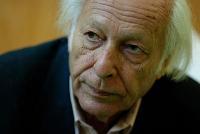 Isn't only about toppling the reigning dictators, but it is an enduring protest movement challenging, at the same time, both various dimensions of the internal social order, especially glaring inequalities in income distribution, and the international order, the place of Arab countries in the global economic order.
Isn't only about toppling the reigning dictators, but it is an enduring protest movement challenging, at the same time, both various dimensions of the internal social order, especially glaring inequalities in income distribution, and the international order, the place of Arab countries in the global economic order.
19.09.2011 | by Samir Amin
 David Adjaye, one of the leading architects from his generation, living between London and New York, returned to Lisbon. 'Urban Africa - A Photographic Journey' was the reason why. This exhibition, recently launched at the Black Pavilion of Lisbon City Hall Museum, is a photographic tour but also a retrospective of memories from an architect who never left Africa.
Born in 1966, in Tanzania, from a family of diplomats, he was soon forced to understand the inevitability of travelling, the need to readapt and redefine oneself. Nevertheless, the nomad lifestyle didn’t break his strong relation with the African continent. His work confirms his deep relationship with its landscapes and its places. In Urban Africa (and also in this conversation) David shares his panoramic view of this vast territory and his – spoken – will to live there again.
David Adjaye, one of the leading architects from his generation, living between London and New York, returned to Lisbon. 'Urban Africa - A Photographic Journey' was the reason why. This exhibition, recently launched at the Black Pavilion of Lisbon City Hall Museum, is a photographic tour but also a retrospective of memories from an architect who never left Africa.
Born in 1966, in Tanzania, from a family of diplomats, he was soon forced to understand the inevitability of travelling, the need to readapt and redefine oneself. Nevertheless, the nomad lifestyle didn’t break his strong relation with the African continent. His work confirms his deep relationship with its landscapes and its places. In Urban Africa (and also in this conversation) David shares his panoramic view of this vast territory and his – spoken – will to live there again.
01.06.2011 | by Rita Palma
 Paulina Chiziane (Majacaze, 1955) is surely one of the most prominent figures of current Mozambican literature, and not just that. She is an essential reference for the country’s feminist movements, a woman who confronted particularly conflictual aspects of African cultures in her literary works with startling intensity, developing themes that no one else wants to hear or discuss, not in the private sphere, much less in the public or political spheres. These are silenced themes, taboos, especially painful, pending and unresolved subjects, such as the Mozambican civil war, women’s rights in polygamy and black magic.
Paulina Chiziane (Majacaze, 1955) is surely one of the most prominent figures of current Mozambican literature, and not just that. She is an essential reference for the country’s feminist movements, a woman who confronted particularly conflictual aspects of African cultures in her literary works with startling intensity, developing themes that no one else wants to hear or discuss, not in the private sphere, much less in the public or political spheres. These are silenced themes, taboos, especially painful, pending and unresolved subjects, such as the Mozambican civil war, women’s rights in polygamy and black magic.  Movement is at the core of life, not necessarily space. If it is translated into space, this is done by means of space being perceived as movement. Therefore, we are facing two completely opposing philosophies. From this point of view, the African movement philosophy, the pre-colonial one, is similar to a rationale specific to the digital world, according to which, fundamentally, one seeks to create connectivity, using networks, instead of tracing categories, classifying, establishing hierarchies and limiting movement.
Movement is at the core of life, not necessarily space. If it is translated into space, this is done by means of space being perceived as movement. Therefore, we are facing two completely opposing philosophies. From this point of view, the African movement philosophy, the pre-colonial one, is similar to a rationale specific to the digital world, according to which, fundamentally, one seeks to create connectivity, using networks, instead of tracing categories, classifying, establishing hierarchies and limiting movement.  In Europe and the United States, there is also the specific return to colonial form and nostalgia. In Portugal, I’ve been struck by the visible presence of what are still referred to as the “explorers” or the “discoveries,” rather than “colonizers” and “encounter.” The depiction of African bodies in official art and monuments is often stereotyped, almost degrading. I don’t see this, unfortunately, as an exception but as an example of the new divisions. Universities set a poor example here, with minorities and people of color being systematically underrepresented on both sides of the Atlantic.
In Europe and the United States, there is also the specific return to colonial form and nostalgia. In Portugal, I’ve been struck by the visible presence of what are still referred to as the “explorers” or the “discoveries,” rather than “colonizers” and “encounter.” The depiction of African bodies in official art and monuments is often stereotyped, almost degrading. I don’t see this, unfortunately, as an exception but as an example of the new divisions. Universities set a poor example here, with minorities and people of color being systematically underrepresented on both sides of the Atlantic.  Our duty, as creative people, to paraphrase the late Nina Simone, should always be to reflect the times we live in. We do this also by challenging constructions of history that have and continue to favour the powerful as we fight for the future we want to see and experience in the world, beyond our own physical existences.
Our duty, as creative people, to paraphrase the late Nina Simone, should always be to reflect the times we live in. We do this also by challenging constructions of history that have and continue to favour the powerful as we fight for the future we want to see and experience in the world, beyond our own physical existences.  Art’s potential is something that can’t be measured, what the encounter with an artwork can do to a subject, how the freedom trapped in a sculpture, a painting, a statement can influence a singularity and masses cannot be said. That also explains our position: we don’t have any superstitious belief in the immediate political efficacy of our work, this is somehow not our main worry, artworks hopefully survive artists and the time for our work to truly touch people might not even have come yet. Like any artist we work because we need to, it’s our way to stay alive.
Art’s potential is something that can’t be measured, what the encounter with an artwork can do to a subject, how the freedom trapped in a sculpture, a painting, a statement can influence a singularity and masses cannot be said. That also explains our position: we don’t have any superstitious belief in the immediate political efficacy of our work, this is somehow not our main worry, artworks hopefully survive artists and the time for our work to truly touch people might not even have come yet. Like any artist we work because we need to, it’s our way to stay alive.  We want a black dyke for president.
We want a person with AIDS for president and we want a trans person for vice president and we want someone with no health insurance and we want someone who grew up in a place where the earth is so saturated with toxic waste that didn’t have a choice about getting leukemia. We want a latino faggot for president who saw their best friends die in a mass shooting. We want a president that had an abortion at sixteen and we want a candidate who is a part-time hooker. We want a differently abled refugee for president. We want a president with no airconditioning, who has stood in line at the clinic, who stole their last meal and has been unemployed and was sexually harassed and gaybashed and deported.
We want a black dyke for president.
We want a person with AIDS for president and we want a trans person for vice president and we want someone with no health insurance and we want someone who grew up in a place where the earth is so saturated with toxic waste that didn’t have a choice about getting leukemia. We want a latino faggot for president who saw their best friends die in a mass shooting. We want a president that had an abortion at sixteen and we want a candidate who is a part-time hooker. We want a differently abled refugee for president. We want a president with no airconditioning, who has stood in line at the clinic, who stole their last meal and has been unemployed and was sexually harassed and gaybashed and deported.  It comes to the present time and looks at African struggle fighters – the construction of the sole hero- and the possibilities that the archive should include other partners by featuring their spouses names in the conversation, however, open to other additions and manners in which to author our histories.
It comes to the present time and looks at African struggle fighters – the construction of the sole hero- and the possibilities that the archive should include other partners by featuring their spouses names in the conversation, however, open to other additions and manners in which to author our histories.  Our original strategy was always to bring African artists to the international stage, which I think is what is missing, and maybe one day we would be very happy to go but I think there are many other places where we can go, which we are trying to do already, for example, workshops for galleries, for artists. I think there’s much more on the educational side of things that we can bring with our knowledge to the continent than having a commercial initiative about sales.
Our original strategy was always to bring African artists to the international stage, which I think is what is missing, and maybe one day we would be very happy to go but I think there are many other places where we can go, which we are trying to do already, for example, workshops for galleries, for artists. I think there’s much more on the educational side of things that we can bring with our knowledge to the continent than having a commercial initiative about sales.  That same evening, Pedro Coquenão, aka Batida, had a Skype meeting planned with one of the activists to talk about “family stuff.” It obviously didn’t go through– his friend had been arrested. The 40 year-old Angolan-born, Lisboa-raised-and-based musician and creative is also an active voice and mind for an evolved and more equal Angolan society– a facet revealed by Coquenão throughout the years as a radio host in Portugal and a DIY documentary director and a musician, first as DJ Mpula and now as Batida.
That same evening, Pedro Coquenão, aka Batida, had a Skype meeting planned with one of the activists to talk about “family stuff.” It obviously didn’t go through– his friend had been arrested. The 40 year-old Angolan-born, Lisboa-raised-and-based musician and creative is also an active voice and mind for an evolved and more equal Angolan society– a facet revealed by Coquenão throughout the years as a radio host in Portugal and a DIY documentary director and a musician, first as DJ Mpula and now as Batida.  Revolutionary female figures, such as Josina Machel, for example, are represented as saints, without bodily form. For me, Yvone Kane should in a way, be represented like Josina Machel. There is a very chaste side to revolutionaries, as if the women were perfect. Not even in the history books do we find out who they really were.
Revolutionary female figures, such as Josina Machel, for example, are represented as saints, without bodily form. For me, Yvone Kane should in a way, be represented like Josina Machel. There is a very chaste side to revolutionaries, as if the women were perfect. Not even in the history books do we find out who they really were.
 It is simply not acceptable in our day and age to show oneself incapable of truly appreciating the sincere feelings and worldview of others, while at the same time stroking one’s own ego and praising openmindedness and respect for differences at every turn! This inability to look at oneself objectively results from sheer autism.
It is simply not acceptable in our day and age to show oneself incapable of truly appreciating the sincere feelings and worldview of others, while at the same time stroking one’s own ego and praising openmindedness and respect for differences at every turn! This inability to look at oneself objectively results from sheer autism.  "I don't consider Brazil that different from Angola, culturally speaking. By the way, Angola currently consumes a lot of global culture. Mostly younger people. Not even the differences in language are an obstacle to the understanding of my comics."
"I don't consider Brazil that different from Angola, culturally speaking. By the way, Angola currently consumes a lot of global culture. Mostly younger people. Not even the differences in language are an obstacle to the understanding of my comics."  The first time I saw Rainha Nzinga of Matamba, I was walking across Luanda's Kinaxixi square with a friend. We stopped to admire the vast bronze tribute to the seventeenth-century Mbundu monarch, who not only fought Portuguese armies, but caused consternation among her own people and played a significant role in developing the Angolan slave trade. I was immediately impressed by the statue, although my friend, an Angolan journalist, was less so. 'In real life, you'd have seen her breasts,' he said, 'but they've been covered up to appease our modern sensibilities.'
The first time I saw Rainha Nzinga of Matamba, I was walking across Luanda's Kinaxixi square with a friend. We stopped to admire the vast bronze tribute to the seventeenth-century Mbundu monarch, who not only fought Portuguese armies, but caused consternation among her own people and played a significant role in developing the Angolan slave trade. I was immediately impressed by the statue, although my friend, an Angolan journalist, was less so. 'In real life, you'd have seen her breasts,' he said, 'but they've been covered up to appease our modern sensibilities.'
 He is Moroccan and French at the same time. He writes in French and nowadays looks at the social and cultural transformations in the countries of the Arab Spring. And expects the new France will adopt a different attitude relating to dictatorships.
With his two passports and the belief in the writer’s role of “criticizing, denunciating, and intervening”, Tahar Ben Jelloun was at Calouste Gulbenkian Foundation at the end of June for a conference in which his aim was “explaining the Arab Spring”.
He is Moroccan and French at the same time. He writes in French and nowadays looks at the social and cultural transformations in the countries of the Arab Spring. And expects the new France will adopt a different attitude relating to dictatorships.
With his two passports and the belief in the writer’s role of “criticizing, denunciating, and intervening”, Tahar Ben Jelloun was at Calouste Gulbenkian Foundation at the end of June for a conference in which his aim was “explaining the Arab Spring”.  And he answers that the production company that he is part of, Generation 80, was born under a very good star: “there is a crisis in the world, money is for some people ever more difficult to get, but technology is also more at hand for everybody. There are advantages in these days of bureaucracies and problems getting a foot in the door – you don’t need an investment of millions to work in this field and to make a film with a camcorder.”
And he answers that the production company that he is part of, Generation 80, was born under a very good star: “there is a crisis in the world, money is for some people ever more difficult to get, but technology is also more at hand for everybody. There are advantages in these days of bureaucracies and problems getting a foot in the door – you don’t need an investment of millions to work in this field and to make a film with a camcorder.”  He paid a visit to studios in the musseques (local neighbourhoods), he had talks with producers to give support for his Akwaaba Music, a digital platform dedicated to African music and pop culture, providing visibility for quality people in music who don’t have the structure needed to go far in the business. In the last 3 years, Lebrave has produced works with more than 70 artists from 15 African countries and has been working on the development of a global network covering the production of contents, digital distribution, marketing and licensing.
He paid a visit to studios in the musseques (local neighbourhoods), he had talks with producers to give support for his Akwaaba Music, a digital platform dedicated to African music and pop culture, providing visibility for quality people in music who don’t have the structure needed to go far in the business. In the last 3 years, Lebrave has produced works with more than 70 artists from 15 African countries and has been working on the development of a global network covering the production of contents, digital distribution, marketing and licensing.  Yonamine is very spontaneous in his work: he thinks about pictures or objects, old photographs, cigarettes packs, or curious textures, then follows their trail to create, to subvert certain applications and to give them other semiotic readings, by reinventing the fragments of different memories in a register of composed intelligibility. Conflict and unpredictability abound in his work and it’s this not classifiable side that troubles, in a good way, who watches it. You can immediately feel the urgency, and this may come largely from living in Angola.
Yonamine is very spontaneous in his work: he thinks about pictures or objects, old photographs, cigarettes packs, or curious textures, then follows their trail to create, to subvert certain applications and to give them other semiotic readings, by reinventing the fragments of different memories in a register of composed intelligibility. Conflict and unpredictability abound in his work and it’s this not classifiable side that troubles, in a good way, who watches it. You can immediately feel the urgency, and this may come largely from living in Angola.  A particular cultural expression results from an expectation that a group has in relation to the culture and the world, but also in its hereditary burden, in what, in the English-speaking world, is well called heritage. Of course, because of tradition or expectation, many of these cultures and groups come into conflict. It may be productive, since it is assumed as a normal part of democracy. As there is negotiation between groups and cultural expressions, where the intervention in the city and political and social issues cannot be replaced by culture, we find ourselves in a rich and democratic situation. Cultural productions should translate that.
A particular cultural expression results from an expectation that a group has in relation to the culture and the world, but also in its hereditary burden, in what, in the English-speaking world, is well called heritage. Of course, because of tradition or expectation, many of these cultures and groups come into conflict. It may be productive, since it is assumed as a normal part of democracy. As there is negotiation between groups and cultural expressions, where the intervention in the city and political and social issues cannot be replaced by culture, we find ourselves in a rich and democratic situation. Cultural productions should translate that.  Isn't only about toppling the reigning dictators, but it is an enduring protest movement challenging, at the same time, both various dimensions of the internal social order, especially glaring inequalities in income distribution, and the international order, the place of Arab countries in the global economic order.
Isn't only about toppling the reigning dictators, but it is an enduring protest movement challenging, at the same time, both various dimensions of the internal social order, especially glaring inequalities in income distribution, and the international order, the place of Arab countries in the global economic order.  David Adjaye, one of the leading architects from his generation, living between London and New York, returned to Lisbon. 'Urban Africa - A Photographic Journey' was the reason why. This exhibition, recently launched at the Black Pavilion of Lisbon City Hall Museum, is a photographic tour but also a retrospective of memories from an architect who never left Africa.
Born in 1966, in Tanzania, from a family of diplomats, he was soon forced to understand the inevitability of travelling, the need to readapt and redefine oneself. Nevertheless, the nomad lifestyle didn’t break his strong relation with the African continent. His work confirms his deep relationship with its landscapes and its places. In Urban Africa (and also in this conversation) David shares his panoramic view of this vast territory and his – spoken – will to live there again.
David Adjaye, one of the leading architects from his generation, living between London and New York, returned to Lisbon. 'Urban Africa - A Photographic Journey' was the reason why. This exhibition, recently launched at the Black Pavilion of Lisbon City Hall Museum, is a photographic tour but also a retrospective of memories from an architect who never left Africa.
Born in 1966, in Tanzania, from a family of diplomats, he was soon forced to understand the inevitability of travelling, the need to readapt and redefine oneself. Nevertheless, the nomad lifestyle didn’t break his strong relation with the African continent. His work confirms his deep relationship with its landscapes and its places. In Urban Africa (and also in this conversation) David shares his panoramic view of this vast territory and his – spoken – will to live there again. 
